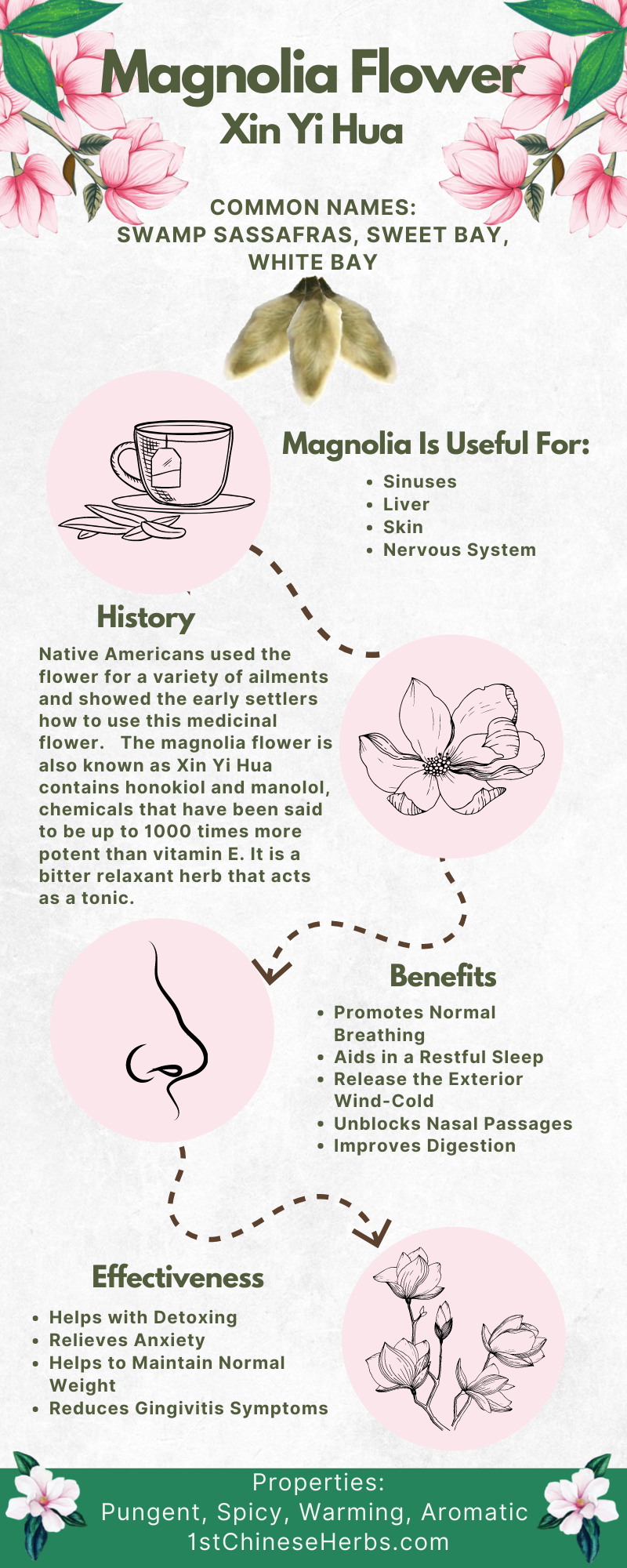Magnolia Flower Bud (Xin Yi Hua) in Traditional Chinese Medicine (TCM)
What is Magnolia Flower Bud (Xin Yi Hua) in TCM?
Magnolia Flower Bud, known as Xin Yi Hua in TCM, comes from the unopened flowers of the Magnolia biondii or Magnolia denudata trees. It has been used for centuries in Traditional Chinese Medicine to treat respiratory issues, especially those related to nasal congestion, sinus problems, and headaches caused by wind-cold or wind-heat invasions.
In TCM, Xin Yi Hua is associated with the Lung and Stomach meridians and is primarily used to disperse wind-cold, promote the flow of qi in the head and nose, and alleviate nasal and sinus blockages. Its ability to clear the nasal passages makes it one of the most commonly used herbs for sinusitis and allergic rhinitis in Chinese herbal formulas.
Why Does Magnolia Flower Bud (Xin Yi Hua) Work?
In TCM, wind-cold or wind-heat invasions often lead to nasal congestion, sinus headaches, and upper respiratory discomfort. Xin Yi Hua works by dispersing wind, opening up the nasal passages, and promoting the flow of qi. It is particularly effective at unblocking the orifices of the nose and sinuses.
Xin Yi Hua’s warming and dispersing nature helps to:
- Clear nasal obstructions caused by wind-cold or wind-heat.
- Relieve sinus headaches associated with blocked nasal passages.
- Reduce inflammation and swelling in the nasal cavities.
It is often combined with other herbs, such as Cang Er Zi (Xanthium Fruit), in formulas to enhance its effectiveness in treating nasal and sinus issues.
What is the Research Behind Magnolia Flower Bud?
Modern research has confirmed some of the traditional uses of Xin Yi Hua. The following findings provide scientific support for its use:
-
Anti-inflammatory and Antiallergic Properties: Studies have shown that Magnolia flower bud extracts possess significant anti-inflammatory properties, which help reduce inflammation in the nasal passages, making it beneficial for sinusitis and allergic rhinitis. Its ability to modulate the immune response can also help alleviate symptoms of allergies, reducing nasal obstruction and sneezing.
- Reference: A study published in The Journal of Ethnopharmacology demonstrated that Magnolia flower extracts exhibit antiallergic properties, helping to reduce symptoms of allergic rhinitis.
-
Antimicrobial Effects: Magnolia flower buds have been found to have antimicrobial effects, which can help reduce infections in the upper respiratory tract. These effects are especially useful in treating bacterial or viral sinus infections.
- Reference: Research in Phytomedicine confirmed the antibacterial effects of Magnolia flower bud extracts, showing efficacy against pathogens commonly associated with respiratory infections.
-
Analgesic (Pain-Relieving) Properties: Studies suggest that Xin Yi Hua can help alleviate the pain associated with sinus headaches and pressure in the head due to blocked sinuses. It works by reducing inflammation and unblocking the nasal passages, which relieves sinus pressure.
- Reference: A study published in Planta Medica found that Magnolia flower bud extracts have analgesic properties, which may explain its effectiveness in relieving sinus headaches.
Interesting Fact About Magnolia Flower Bud (Xin Yi Hua)
Xin Yi Hua is one of the oldest herbs used in TCM for sinus relief, dating back over 1,000 years. Ancient Chinese texts describe its effectiveness in clearing nasal passages, and it has been a staple in herbal formulas for treating sinusitis and nasal congestion ever since. Its role in TCM formulas for "Bi Yuan" (nasal blockage) has remained unchanged for centuries.
Frequently Asked Questions (FAQ) About Magnolia Flower Bud
1. How is Magnolia Flower Bud (Xin Yi Hua) typically used in TCM?
Magnolia Flower Bud is commonly used in decoctions, powders, or capsules. It is usually combined with other herbs that treat sinus and nasal congestion, such as Cang Er Zi (Xanthium Fruit), in formulations designed to relieve symptoms of sinusitis, rhinitis, or nasal allergies. It can also be used as a nasal rinse when included in herbal infusions.
2. Can I use Magnolia Flower Bud for allergies?
Yes, Xin Yi Hua is effective for treating allergic rhinitis, particularly when symptoms include nasal congestion, sneezing, and sinus headaches. It works by reducing inflammation in the nasal passages and clearing blockages. If used regularly during allergy season, it may help prevent flare-ups of allergic rhinitis.
3. Are there any side effects or precautions when using Xin Yi Hua?
Xin Yi Hua is generally considered safe when used in appropriate amounts. However, it is a warming herb, so it should be used with caution in individuals who have heat conditions or excessive internal heat. Overuse may also cause dryness in some individuals. Always consult a qualified TCM practitioner to ensure it’s the right herb for your condition, especially if you are pregnant or nursing.
Herbal Information for Magnolia Flower Bud in Single Herb Extract
Common Name: Magnolia Flower
Botanical Name: Magnolia denudata flower
Channels/Meridians: Lung, Stomach
Pin Yin Name: Xin Yi Hua
Package Size: 100 grams (3.5oz.)
Form: Single Herb Extract Granules
Brand: Plum Flower
Cautions: Do not use if pregnant or nursing. Considered safe used in recommended doses. Overly high dosing could cause vertigo or headaches. Small percentage of people may develop an allergic rash when magnolia is applied to the skin.
Product Properties: Spicy, Warm, Pungent

Benefits of Magnolia Flower
Xin Yi, also known as Herba Magnoliae, is a traditional Chinese herb that has been used for centuries for its medicinal properties. It is believed to have a variety of health benefits, including:
Respiratory health: Xin Yi has been used to alleviate symptoms of respiratory conditions such as sinusitis, allergies, and asthma.
Anti-inflammatory properties: Xin Yi contains compounds that have been shown to reduce inflammation in the body, which can help alleviate symptoms of conditions such as arthritis and other inflammatory diseases.
Pain relief: Xin Yi has been used to alleviate pain associated with headaches and other conditions.
Digestive health: Xin Yi has been used to treat digestive issues such as bloating, diarrhea, and nausea.
Immune system support: Xin Yi has been found to boost the immune system, helping the body fight off infections and illnesses.
It is important to note that while Xin Yi has been used for centuries in traditional Chinese medicine, more research is needed to fully understand its potential health benefits and any potential side effects. As with any herbal supplement, it is important to consult with a healthcare provider before using Xin Yi.
Benefits Nasal Passages
Promotes Normal Digestion
Aids In Restful Sleep
Helps In the Relief of Stress
Supports Respiratory Conditions
Commonly Used for Skin Care
Key Actions: Similar actions to magnolia bark, but milder and with greater focus on the Upper and Middle Burners (aka Jiao). Regulates Liver Qi, Expels Damp, Calms Shen.
Key Constituents: Magnolol, Honokiol, Eudesmol

Main Characteristics (Attributes) of Herbs
Harvested at the proper level of maturity and correct time of the season to maximize potency.
Free from Chlorine
Manufactured without the use of sulphur
Preservative Free
Made at GMP internationally certified facilities (Good Manufacturing Practices) Quality control tests are done at the manufacturing site and at third party labs to confirm results
Aluminum Phosphate free
Packaged in an airtight sealed bag
Pin Yin Names and Botanical Names are listed on the bag
Certificate of Analysis are available upon request
Conforms to Standards of Chinese Pharmacopeia
No dyes, colors, or bleaching of the herbs
We are a authorized direct distributor of Plum Flower Herbs.
500 gram bag size which equal anywhere from 4 to 6 cups of herbs
Chinese Traditional herbs should be regarded as a supplementary aspect to modern western healthcare, and not as a replacement. Chinese traditional herbs ( Teas ) emphasize harmony, and balance.















